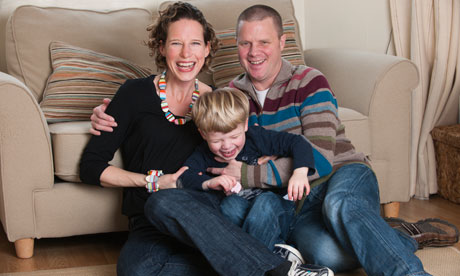
For most people turning 40 is a shock, but for me it will be a revelation. I have cystic fibrosis (CF), and reaching this age was always unlikely. Life expectancy is currently set at 38 years for CF sufferers – though for a long time it was fixed at 30. Reaching my 30s often seemed unachievable, while 40 felt impossible. Not many people with CF in the UK make it this far. It always feels inspirational when someone hits this milestone.
When people look at me, they see a married 39-year-old with a gorgeous three-year-old son, Felix. I work in London as a communications consultant and play sport regularly. What they don't see is my illness, which is one of the UK's most common life-threatening inherited diseases. Cystic fibrosis clogs up your lungs and digestive system with a thick sticky mucus. It makes it hard to breathe, exercise and digest food. It is relentless and unforgiving – like having a heavy chest cold every day of your life. There is no cure.
At birth, I was not expected to live much past my teens. Every day has been a battle to stay alive and defy the odds. My survival regime over the past 25 years has roughly consisted of swallowing 364,000 tablets, having 10,000 nebuliser sessions, 18,200 physiotherapy sessions, 50 IV treatments, 600 visits to the chemist and 250 visits to hospital.
This merely maintains my current state of health. I cannot take a day off, or cut any corners, as one lapse could be my undoing. My mum, a nurse, diagnosed me at six months and instilled in me the discipline to control my illness. And my dad, a field hockey enthusiast, made sure I played sports, which exercised my lungs and kept me fit. In fact, I think a large part of my longevity can be credited to sport, particularly hockey (I represented England in my teens). I still play for my club most weekends, which is something I am really proud of, as it is not just vital for my lungs, but shows everyone that CF isn't winning the battle.
For most of my life I tended to suppress all my emotions about the condition and was guarded about telling people about it. I never wanted anyone to feel sorry for me, or to view me as the "ill person". But because I knew that life was likely to be short, having my own house, wife and child seemed unattainable. In my 20s I saw only a hopeless end. In the lead up to my 30th birthday, my fixation over my life expectancy was exacerbated by the deaths of friends with CF. With each departure, I questioned why I was still here when they were not. How had I cheated death? It made 30 seem like a holy grail. Yet, conversely, it also made it a tipping point once I reached it. I wanted to carry with me the spirit of my friends who had died, and make my longer life count for something. When so much of a CF life is not at all normal, it is fulfilling to do something that your peers take for granted but is breaking the CF boundaries. Once I turned 30 and was feeling healthy enough, marriage to Katie and starting a family seemed a natural way to defy the illness.
Then in August 2009 I was diagnosed with Type 1 diabetes. And in a strange way, having to deal with two conditions is the thing that has made me want to share my feelings about my illness. For the first time I want to highlight the magnitude of what I have achieved. I feel determined to flip my mindset from a fear of dying to a desire to live for much longer.
I view 40 as a celebration of my survival; but it is also a launchpad for the rest of my life, especially now that I have a wife and son to share it with. CF is not defining me. All the medication is just something I do during the day in order to live my life; and, in my dark moments, humour and laughter are my armour. My life needs to be as light-hearted as possible because dealing with CF is so serious.
As I approach my 40th birthday next month, it feels natural to reflect on my journey so I've started a countdown blog – it is a great way to share my experiences, provide inspiration for people living with the disease and remind them that, even when the odds are stacked against you, there is sometimes a way to overcome them.
• For more information, visit cftrust.org.uk/

